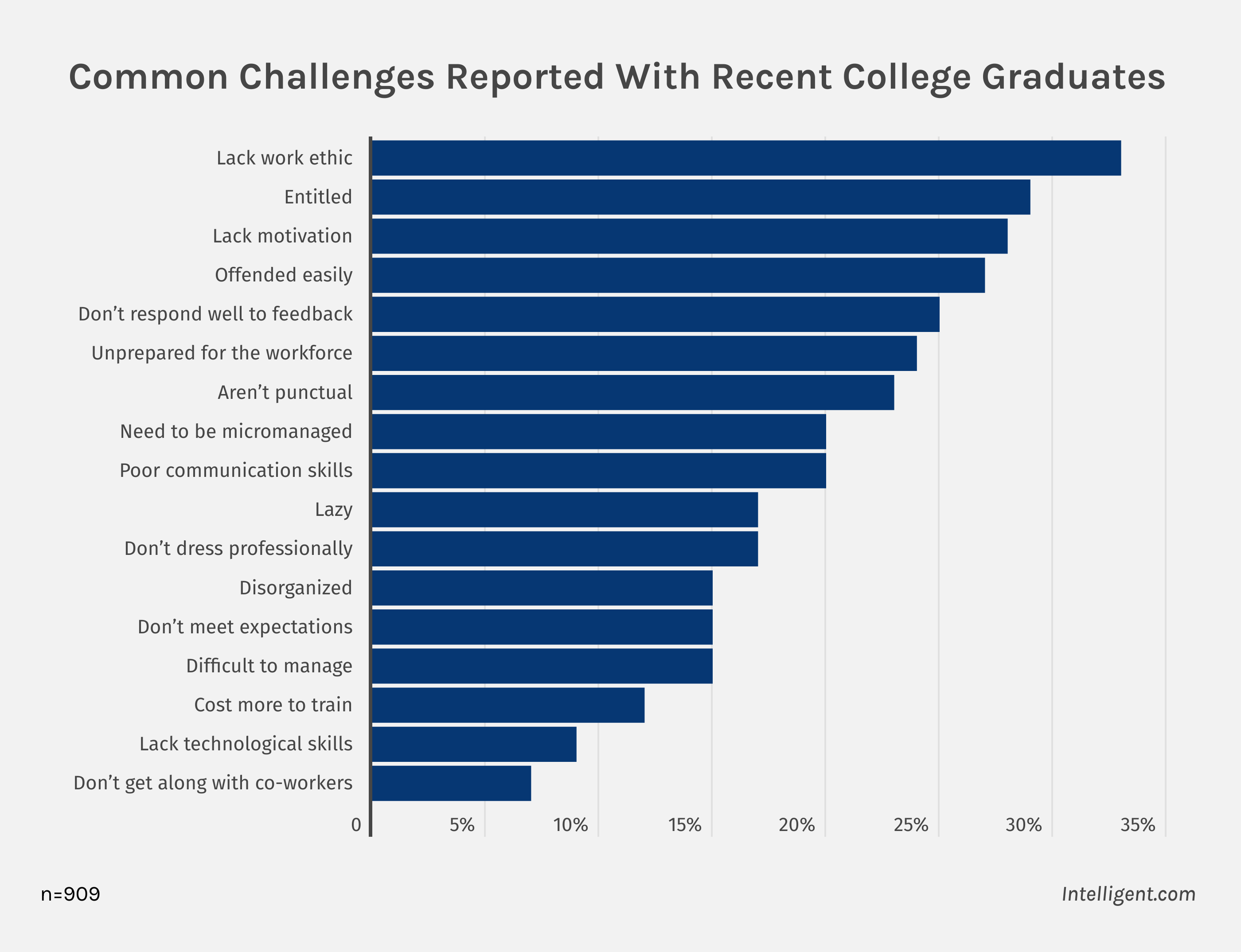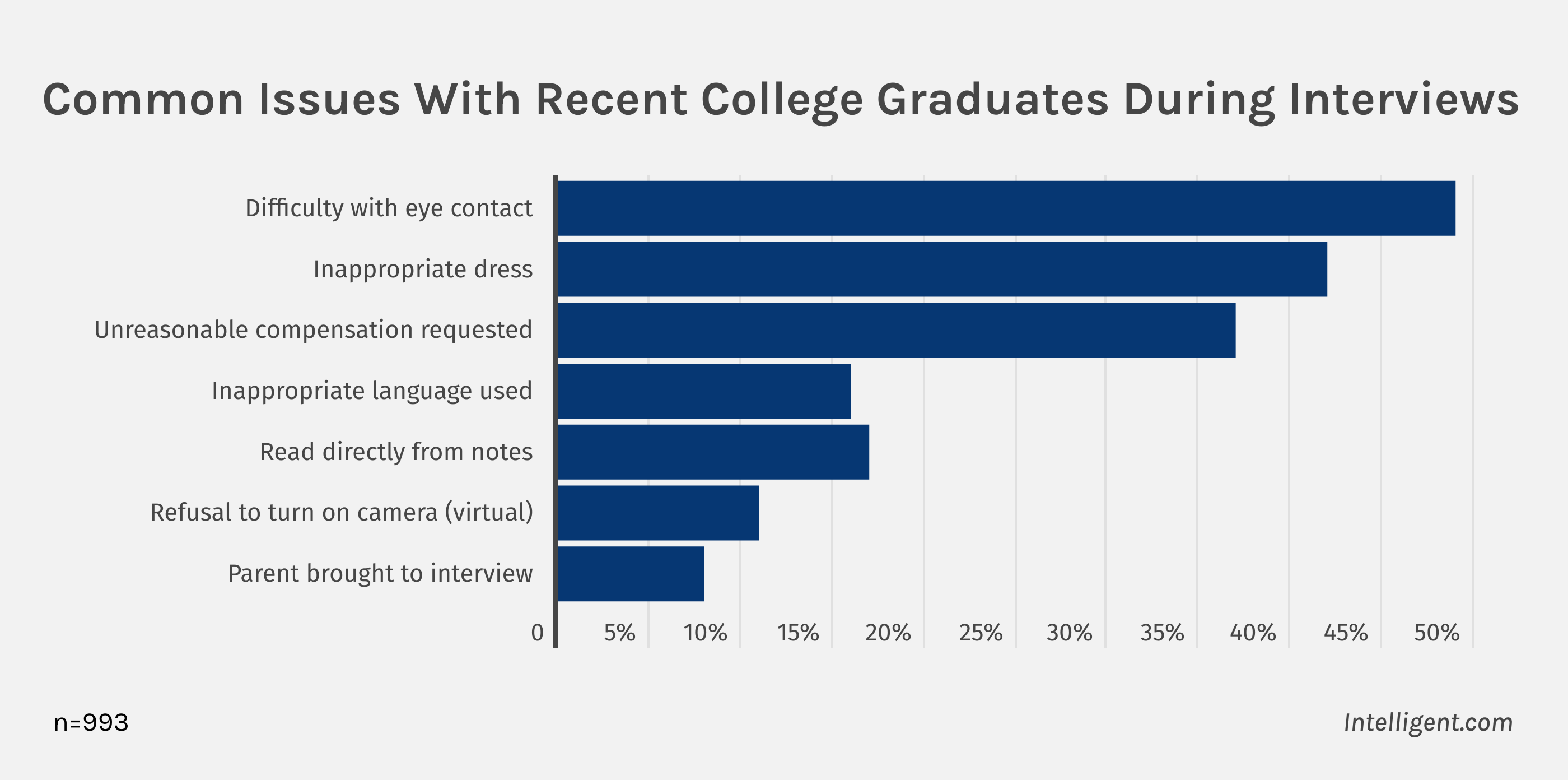In recent years, a narrative has emerged that Gen Zers aren’t excelling in the workforce due to poor attitudes and work ethic.
At the end of December 2024, Intelligent.com surveyed 1,000 managers involved in hiring for entry-level positions to learn about their attitudes toward offering opportunities to recent college graduates.
What we found:
- 1 in 8 hiring managers will avoid hiring recent college graduates in 2025
- 33% of hiring managers say recent graduates lack work ethic, and 24% say they’re unprepared for the workforce
- 1 in 4 find recent graduates underprepared for interviews
- During interviews, hiring managers say recent college graduates struggle with eye contact, dressing appropriately, and negotiating compensation. Additionally, nearly 1 in 10 hiring managers have had a candidate bring a parent to an interview.
- 55% of hiring managers had to fire a recent college grad in 2024
1 in 8 Hiring Managers Plan to Avoid Recent College Graduates This Year
The vast majority of hiring managers surveyed (97%) say their companies will hire for entry-level positions in 2025. However, 12% state they will avoid hiring recent college graduates for these positions and instead will prioritize hiring older candidates.
3 in 10 Hiring Managers Find Recent Grads Lack Work Ethic
Of the hiring managers surveyed who say they’ve worked with recent graduates (91%), 33% say recent college graduates lack work ethic, while 29% believe they are entitled, and 28% feel they lack motivation. Additionally, 27% say they are easily offended, 25% think they don’t respond well to feedback, and 24% believe they’re unprepared for the workforce. Other concerns include lack of punctuality (23%), need for micromanagement (20%), poor communication skills (20%), and laziness (17%).
In 2024, 55% of hiring managers say they were part of the decision-making process to fire a recent college graduate.

“Instead of avoiding recent college grads entirely based on biases and stereotypes, hiring managers need to adopt more proactive and nuanced approaches to identifying promising candidates,” says Intelligent’s Chief Education and Career Development Advisor, Huy Nguyen. “It’s important to find individuals who’ve demonstrated motivation, adaptability, and growth potential. Specific skills and processes can be easily taught to someone who is motivated and has the right attitude.
“By implementing more behavioral interview techniques, hiring managers can gain better insight into a candidate’s past experiences, approach to problem-solving, resilience when overcoming adversity, and taking initiative in certain situations.”
1 in 4 Hiring Managers Say Recent Graduates Aren’t Prepared for Interviews
Many hiring managers don’t feel recent graduates are prepared for the interview process. Overall, 24% of hiring managers find recent college graduates somewhat (20%) or very unprepared (4%) for interviews.
When interviewing recent graduates they’ve found candidates struggle with eye contact (49%), dressing appropriately (42%), and asking for reasonable compensation (38%). Additionally, 8% have experienced a candidate bringing a parent to an interview.

”Recent college graduates should be aware of the negative perceptions and biases that exist against them. By understanding what frustrates managers the most and taking an intentional approach to interviewing, candidates can increase their chances of making a good impression and standing out among the sea of other applicants,” says Nguyen.
“Recent graduates should spend time thoroughly researching the company and tailoring their resume, cover letter, and any outreach communication to the specific job. They should also be prepared to demonstrate initiative and genuine interest. A good way to do this is by asking thoughtful questions. It’s also critical for recent graduates to articulate how their values and experiences align with the organization’s.”
Methodology
All data found within this report derives from a survey conducted on December 30, 2024 by survey platform Pollfish and commissioned by Intelligent.com. In total 1,000 U.S. managers who are involved in hiring entry-level employees were surveyed.
Demographic criteria and screening questions were used to ensure qualified respondents. This criteria included age (27+), organizational role, employment status (employed full-time), and company size (>20).
To avoid bias from this component Pollfish employs Random Device Engagement (RDE) to ensure both random and organic surveying.
For more information contact pr@intelligent.com.